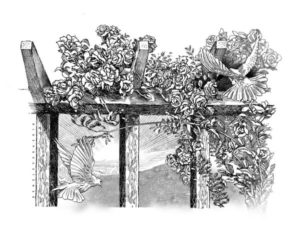
The last detail gives me away. I have a passion for flowers, which I might have inherited from my mother, who surrounds her living quarters with dahlias, roses, asters, and many others, including, yes, hibiscuses. But of her countless blooms, there is one I haven’t found in any of her gardens — the morning glory.
Ever since, I have searched for the morning glory. Whenever I find it I would always pause to take a good look at it, quietly reciting one of my favorite poems, a haiku by Matsuo Basho, which Robert Bly translates as follows:
The Morning Glory
Another thing
That will never
Be my friend
When I had two water tanks set up atop two steel towers, I thought of planting the morning glory at their base to let it climb and wind around the posts. What a delightful sight it would be if in the morning I should wake up to its fully opened blue flowers.
After asking around for where I could get morning glory seeds and receiving uncertain answers, I finally resorted to ordering them online. Which was why I received the call this morning and the notice to deliver the seeds today.
While waiting for the seeds to arrive, I searched for a fitting poem and found this piece by Robert Frost, “Putting in the Seed”—
You come to fetch me from my work to-night
When supper’s on the table, and we’ll see
If I can leave off burying the white
Soft petals fallen from the apple tree.
(Soft petals, yes, but not so barren quite,
Mingled with these, smooth bean and wrinkled pea;)
And go along with you ere you lose sight
Of what you came for and become like me,
Slave to a springtime passion for the earth.
How Love burns through the Putting in the Seed
On through the watching for that early birth
When, just as the soil tarnishes with weed,
The sturdy seedling with arched body comes
Shouldering its way and shedding the earth crumbs.
Here the speaker, who’s into gardening — a “slave to a springtime passion for the earth”— is fetched by someone, perhaps his wife, so they could have supper.
He hesitates, and wonders if he should leave his work — he is putting away the petals that have fallen from an apple tree, especially since he has found a seed among them.
Nonetheless, he feels that he should go, afraid that she might be enticed by the seed and like him be obsessed with gardening. Because he himself finds passion in putting the seed into the earth and waiting for it to germinate and put out its first leaves.
Somehow the fate of the seed reminds me of an incident that John writes of in his Gospel, when, during the Feast of the Passover, some Greeks approached the apostle Philip, asking if they could see Jesus. Philip told his companion Andrew about this and they both went to Jesus to relay to him the request of the Greeks. When he learned of this, Jesus said, “The hour has come for the Son of Man to be glorified. Amen, amen, I say to you, unless a grain of wheat falls to the ground and dies, it remains just a grain of wheat; but if it dies, it produces much fruit.”
Jesus was really just using the grain of wheat as a metaphor for the spiritual life, and continued with this paradox, “Whoever loves his life, loses it, and whoever hates his life in this world will preserve it for eternal life.”
What this means is that one’s inordinate love of this world — and what it offers (wealth, pleasure, power and honor) — spells the loss of one’s soul. One should be like a seed that falls to the ground to break up and die, in order to sprout into new life, thence to flower and bear fruit.
When they will finally arrive, I intend to put the seeds into the ground without delay. They will probably yield five or six climbers. Aside from greeting me in the morning with the sun, I want them, having the passage of John in mind, to guard me against the temptation to live for this earthly life alone, and so I should set some of them at the house entrance, taking my cue from another haiku of Basho:
The morning glories
bloom, securing the gate
in the old fence.